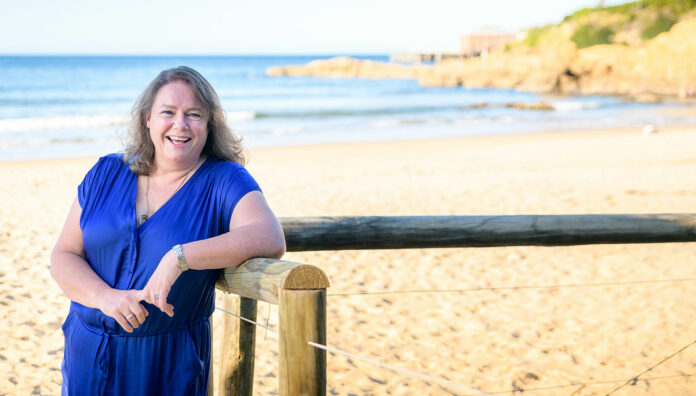From producing the world’s first comprehensive guide to drugs in sport to supporting her community through bushfires, and now the pandemic, Linda Badewitz-Dodd MPS is always willing to step up to the challenge.
A coal-face pharmacist who practices what she preaches. A pioneer. A community leader. These are just a few of the ways Ms Badewitz-Dodd’s peers describe her, and it’s easy to see why.
Her pharmacy in Merimbula on the New South Wales south coast, which she co-owns with business partner Tania Dwyer, provides a wide range of professional services with a focus on personalised support and care. During the 2019–20 bushfires, the pharmacy remained open, supplying face masks, essential medicines and emergency support to the community, while Ms Badewitz-Dodd dealt with the threat of fire to her own home in nearby Tathra.
‘When you live in a small town, your friends become your family,’ she says. ‘Ensuring the pharmacy stayed open and getting things for the community when it needed them was very rewarding. Helping people and accepting help (when you are accustomed to giving it) – that’s what defines community to me.’
Ms Badewitz-Dodd will share her incredible career story in an an episode of PSA’s new podcast, Pharmacy & Me, coming soon.
A clinical start
Ms Badewitz-Dodd didn’t always aspire to life as a community pharmacist. After graduating from the University of Sydney in 1985, she did a post graduate diploma in hospital pharmacy as it ‘offered an avenue for specialties and to see closer at hand your knowledge being applied’.
She went on to work as a clinical pharmacist at Sydney’s Royal Prince Alfred Hospital, doing ward rounds with doctors and spending time in the intensive care, neurosurgery and neurosurgical intensive care units.
‘That was an amazing experience. It’s when I realised that we’re all here together for one purpose, and that’s looking after the patient … It shaped my belief in pharmacists being part of a team and able to contribute meaningfully.’
Drugs in sport
Before the 1990 Commonwealth Games in Auckland, Ms Badewitz-Dodd, by then Managing Editor of MIMS, wanted to include a`Permitted in Sport’ or `Not Permitted in Sport’ symbol in MIMS Bi-Monthly that clearly identified products that could be taken by athletes.
‘If you have an opinion, voice it. don’t be afraid to be wrong or to have the discussion – and know when not to accept a simple “no”.’
From then producing a handbook for athletes, coaches and sport management staff was a logical progression and resulted in the first edition of Drugs in Sport in 1990, she recalls.
‘A similar publication was produced for MIMS UK. Then the world was becoming digital and internationally there were “Live Drug Databases” which were the precursors to the Current Global DRO – a collaboration between numerous countries including the United States, Canada, the United Kingdom, Australia, Switzerland, New Zealand, Japan and others.’
Ms Badewitz-Dodd and the other pharmacists in the group manage the ingredients and she additionally manages the brands for Australia, Canada and New Zealand.
A seachange
Having her first child meant, sadly, stepping away from MIMS as, ‘nothing compared to being a mum’.
Ms Badewitz-Dodd continued her drugs in sport consultancy work, joined PSA’s NSW Branch Committee and presented Insight, a PSA education program (‘on cassettes!’).
Meanwhile, her husband David Dodd was working hard in his pharmacy at Eastwood, in Sydney’s north-west.
The long hours took its toll on the young family (the couple had children aged 2 and 4 at this point). They spent a few months travelling before moving to Tathra where they began working for local pharmacist Warren Seeto, who had been Ms Badewitz-Dodd’s first (and last) boss.
And while she continued to raise their children, Mr Seeto and Mr Dodd went into partnership – until his tragic death in 2013 when he was hit by a car.
‘When my husband was killed I inherited his half of the business, so I had to set up and become a community pharmacist,’ Ms Badewitz-Dodd says.
‘I was doing a bit of relieving around the place, but it was never my passion. It is now though,’ she says. ‘I think whatever you choose to do, if you don’t do it with passion, people can tell.’
Her advice for others is to be brave. ‘If you have an opinion, voice it. Don’t be afraid to be wrong or to have the discussion – and know when not to accept a simple “no”.’
What change in pharmacy in the past 2 years were you most excited about?
The drive to empower pharmacists to practice to their scope of practice is a game changer for me professionally. Recognition that pharmacists can and do provide services to our community, such as vaccinations and administration of IM and SC medicines, is well overdue. I am excited to see where this will take us.
What action in PSA’s Pharmacists in 2023 is the most important?
That is a difficult question as so many of the actions go hand in hand. But Action 4: Facilitate pharmacist prescribing within a collaborative care model has the most scope for our profession. For example with flu vaccinations, we already prescribe – we make the clinical judgment as to whether it is beneficial for a particular patient and then act accordingly. There are so many other things we can do – let’s just do it.
The PSA Intern of the Year Award is proudly sponsored by Symbion.



 Professor Margie Danchin[/caption]
Professor Margie Danchin[/caption]

 Dr Peter Tenni[/caption]
Dr Peter Tenni[/caption]
 How should we deprescribe gabapentinoids, according to the Maudsley Deprescribing Guidelines[/caption]
How should we deprescribe gabapentinoids, according to the Maudsley Deprescribing Guidelines[/caption]



 Pharmacists have always prescribed, but they have the potential to prescribe much more
Pharmacists have always prescribed, but they have the potential to prescribe much more






